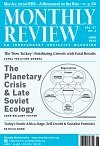Global
The Institutional Architecture
Insofar as imperialism is about the struggle over and capture of economic territory (which must be broadly defined to include not just geographical territory such as land and natural resources, but also the creation of new markets, sources of labor, and forms of surplus transfer such as are reflected in intellectual property), these changes [in imperialism since the early 20th century] have created distant demands upon imperialist structures and processes…. [So] how can capital (which is increasingly global in orientation) generate the superstructures through which the transfers of value are ensured and the investment risks are moderated and contained? It will be argued that there has been an endeavor to resolve this by refashioning the global institutional architecture in ways that operate to increase the conditions of “stability” for large capital while increasing its bargaining power vis-à-vis working people and citizens, as well as nation-states and even smaller capitalist enterprises. | more…

Michael A. Lebowitz explores the obvious but almost universally ignored fact that as human beings work together to produce society's goods and services, we also “produce” something else: namely, ourselves. Human beings are shaped by circumstances, and any vision of socialism that ignores this fact is bound to fail, or, at best, reproduce the alienation of labor that is endemic to capitalism. But how can people transform their circumstances in a way that allows them to re-organize production and, at the same time, fulfill their human potential? These essays repay careful reading and reflection, and prove Lebowitz to be one of the foremost Marxist thinkers of this era. | more…

The Hidden Structure of Violence marshals vast amounts of evidence to examine the costs of direct violence, including military preparedness and the social reverberations of war, alongside the costs of structural violence, expressed as poverty and chronic illness. It also documents the relatively small number of people and corporations responsible for facilitating the violent status quo, whether by setting the range of permissible discussion or benefiting directly as financiers and manufacturers. The result is a stunning indictment of our violent world and a powerful critique of the ways through which violence is reproduced on a daily basis, whether at the highest levels of the state or in the deepest recesses of the mind. | more…

In two Monthly Review special issues, “Education Under Fire: The U.S. Corporate Attack on Students, Teachers, and Schools” (July-August 2011) and “Public School Teachers Fighting Back” (June 2013), we sounded an alarm regarding the rapid restructuring and privatization of U.S. K–12 public schools. In terms of the scale of nationwide restructuring, the corporate takeover of education is unprecedented in modern U.S. history. The closest comparison we can come up with is the destruction of the street car systems across the United States and the building of the interstate highway system—in which freeways went right through cities for the first time, often in the face of neighborhood and community resistance. With respect to K–12 education, unimaginable amounts of private funds have gone into pressuring and corrupting government at every level, while the control mechanisms of the new educational system are increasingly left in private, not public, hands. The Common Core Standards and related high-stakes tests are at the center of this new system, and are the product of private corporate groups outside the direct reach of government. | more…
On the Transition to Socialism in Venezuela
On October 20, 2012, less than two weeks after being reelected to his fourth term as Venezuelan president and only months before his death, Hugo Chávez delivered his crucial El Golpe de Timón (“Strike at the Helm”) speech to the first meeting of his ministers in the new revolutionary cycle. Chávez surprised even some of his strongest supporters by his insistence on the need for changes at the top in order to promote an immediate leap forward in the creation of what is referred to as “the communal state.” This was to accelerate the shift of power to the population that had begun with the formation of the communal councils (groupings of families involved in self-governance projects—in densely populated urban areas, 200–400 families; in rural areas, 50–100 families). The main aim in the new revolutionary cycle, he insisted, was to speed up the registration of communes, the key structure of the communal state. | more…
“Marx was before all else a revolutionary. His real mission in life,” noted Frederick Engels at Marx’s graveside, “was to contribute in one way or another to the overthrow of capitalist society and of the forms of government which it had brought into being, to contribute to the liberation of the present-day proletariat.” Could the same be said about Marxist economists? That they are revolutionaries whose real mission is to contribute to the overthrow of capitalism? | more…
Interview with Marcello Musto
The International Working Men’s Association (IWMA), nowadays better known as the First International, was founded in London in September 1864. Despite the importance of the event, there has not been much attention to its 150th anniversary. To an extent, this reflects the situation of the present day, with the hegemony of neoliberal politics and, conversely, the weakness of the left, that does not seem to be interested in its own history and the lessons that might be extracted from past experiences.… Luckily, there are exceptions. Marcello Musto, an assistant professor of sociology at York University in Toronto, has contributed to two important presentations of the experience of the First International… The International after 150 Years: Labour Versus Capital, Then and Now …[and] the first English-language anthology on the IWMA, Workers Unite! The International 150 Years Later. | more…
From humanitarian and ecological viewpoints, many aspects of the capitalist economic system are irrational; although they are certainly rational from the more limited standpoint of the individual business or capitalist seeking to make profits.… With regard to the environment there are scores of examples of irrational behavior by capitalist businesses that have the ultimate goal of making profits. Many practices and side effects of the way the system functions degrade the ecosystem and its processes on which we depend and may also directly harm humans. For example, it is not rational to introduce chemicals into the environment, including into products we use daily, that are either toxic or cause illnesses of various types. Yet there are over 80,000 chemicals used in the United States; few of them are tested for their effects on people or other species, and many commonly used ones are suspected to be carcinogens or have other detrimental effects. | more…
Last summer, astrophysicist Neil DeGrasse Tyson was asked to comment on the furor surrounding genetically modified organisms (GMOs). He responded with the assertion that humans have been genetically modifying organisms for millennia, giving us food crops such as seedless watermelons or corn. This process, he stated, is little different from genetic engineering.… Tyson’s first mistake lies in his equation of artificial selection and genetic modification, reflecting common misunderstandings of both the sources of genetic variation and the distinction between the latter and mechanisms of evolutionary change. Tyson’s second mistake is his failure to see the bigger picture. The dynamic of capital accumulation is fundamentally at odds with ecosystem dynamics. And technology, in our society, is the handmaiden of capital accumulation. This article will elaborate on these distinctions and discuss some of the basic biological processes underlying GMOs and their potential risks, especially risks of dispersal. It will then examine how capitalism molds the technology and accentuates the risks. | more…
The Liberal Attack on Naomi Klein and This Changes Everything
Naomi Klein’s new book, This Changes Everything [argues that the source of the looming crisis from climate change] is not the planet, which operates according to natural laws, but rather the economic and social system in which we live, which treats natural limits as mere barriers to surmount. It is now doing so on a planetary scale, destroying in the process the earth as a place of human habitation.… In the age of climate change, Klein argues, a system based on ever-expanding capital accumulation and exponential economic growth is no longer compatible with human well-being and progress—or even with human survival over the long run.… In this way Klein…signals that she has now, in William Morris’s famous metaphor, crossed “the river of fire” to become a critic of capital as a system.… [This] has led to a host of liberal attacks on This Changes Everything, often couched as criticisms emanating from the left. These establishment criticisms of her work, we will demonstrate, are disingenuous, having little to do with serious confrontation with her analysis. Rather, their primary purpose is to rein in her ideas, bringing them into conformity with received opinion. If that should prove impossible, the next step is to exclude her ideas from the conversation. | more…
Clarifying what Karl Marx thought of the role of cooperatives is useful, not to receive the “correct” answer to what that role will be, but to help think through what alternatives answers might be and how they might color today’s expectations of the cooperative movement. If one sees a non-capitalist or socialist organization of society as ultimately desirable, then how should we answer the following questions in the present day: (1) Are co-ops in production, worker-owned enterprises, desirable experimental improvements to the organization of production over standard capitalist practices, in the direction of immediate social welfare? (2) Are such co-ops in production also little islands of a different future, models of socialism within a capitalist society? (3) Are they beachheads of socialism, politically practical steps along the road to bringing forth such a possible alternative society? (4) Will they ultimately also be the foundations of such a society, if it develops? (5) All in all, what is their importance, their role, in daily struggles? | more…
Had Marx written Capital in the early twenty-first century, knowing what he could not discern in 1867—that the global dominance of capital, through the military and imperialism, would be realized by the United States—this is the book he may have written using the methodology he developed in the mid-nineteenth century.… What Walter Johnson desires is to change entirely the way we think about the history of the United States, particularly the development of capitalism. He also wants to change how we think about the application of dialectical materialism to the United States. Like Marx, Johnson marshals thick description to disclose the theses that emerge. | more…


